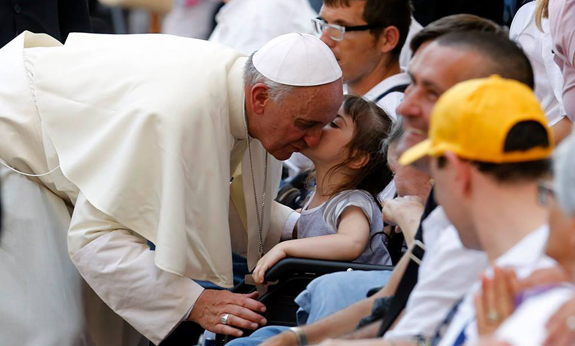On Thursday in the Holy See Press Office a press conference was held to present the Jubilee of the sick and disabled from the 10th to 12th June. The panel was composed of Archbishop Rino Fisichella, president of the Pontifical Council for Promoting New Evangelisation, Bishop José Octavio Ruiz Arenas and Msgr. Graham Bell, respectively secretary and under-secretary of the same dicastery.
The Jubilee was scheduled to begin on Friday with a pilgrimage from Castel Sant’Angelo to the Holy Door. Later, at 5 p.m., in the Church of Santa Maria in Vallicella, there will be a catechesis addressed to all and in particular to the deaf and blind, given by the Redemptorist Fr. Cyril Axelrod, also deaf and blind and known throughout the world, especially in China, the United Kingdom and South Africa, for his full commitment to disability issues. The catechesis will be made available in International Sign Language (ISL), in Italian sign language and in tactile sign language.
On Saturday 11 there will be two special moments. The first, of a religious nature, will be an appointment in various churches in the city centre from 10 to 11 am., for catechesis offered in various languages and methods of communication, entitled “Mercy, source of joy”. In the Church of Sant’Andrea della Valle there will be, in Italian, a symbolic catechesis with a dramatisation of the Gospel reading and various simple gestures to accompany prayer, which will enable those with intellectual disabilities to participate.
The second will be a celebration in the gardens of Castel Sant’Angelo, from 6 to 8 p.m., entitled “Beyond the Limit”, to be attended by a number of well-known artists, singers and dancers performing alongside the sick and disabled. From 2 p.m., also in the gardens, seven tents will be set up with stands representing various pastoral and volunteer associations and organisations, who will share their experience of evangelisation for and with the world of sickness and disability.
On Sunday 12 June in St. Peter’s Square pilgrims will have the opportunity to listen to testimonies from people affected by sickness or disability, and from those who live in close contact with it, on the theme “When I am weak, I am strong”. At 10.30 the Pope will preside at the Eucharistic celebration which will be accessible worldwide via live streaming with sign language. The liturgical service and the readings will have as their protagonists people with disabilities, and in particular among the altar servers there will be a number of people with Down syndrome and intellectual disabilities. One of the deacons, German, is deaf, the first reading will be read by a disabled Spanish person, and the second will be read in English in Braille by a blind child. All the readings will be translated into international sign language by deaf people from various countries, and the prayers of the faithful in different languages will be read by sick and disabled people of various nationalities. Then, for the first time in St. Peter’s Square, the Gospel reading will be dramatised by a group of people with intellectual disabilities, to enable the text to be understood by pilgrims with mental and intellectual disabilities. At the moment of communion, the Sistine Chapel Choir will be substituted by the “Amoris Laetitia” Choir which, long with other choirs that also use sign language, made up of people with disabilities, will sing Pane del Cielo (Bread of Heaven).
During the Mass, the painting of the Virgin Salus infirmorum, conserved in the Church of St. Mary Magdalen in Campo Marzio, Rome and venerated and invoked as help of the sick, will be displayed.
The initiative of the Med Tag Foundation merits special attention. From Friday 10 June, in the vicinity of the Vatican basilicas, there will be four “Health Points”, which will offer specialised health care free of charge, especially to the city’s many homeless. Around 350 volunteers, including women religious, Red Cross nurses, military staff and health care workers, will offer to more than 700 homeless people the possibility of a specialised examinations in the fields of general medicine, dermatology, senology, paediatrics and gynaecology. Vaccines will be administered against pneumonia, which is one of the most serious health risks for such people. Women will be offered PAP tests free of charge.
After presenting the Jubilee for the sick and disabled, Archbishop Fisichella provided further information on the development of the Jubilee Year. “According to the data available today, the number of pilgrims who have visited Rome for the various Jubilee initiatives and who have visited the four basilicas, as well as the Holy Door of the Shrine of Divine Love, is 9,100,935. It is a significant number for the first six months of the Jubilee, which confirms the great desire of many faithful from all over the world to come to Rome to meet Pope Francis, even though there are many Doors of Mercy around the globe”.






